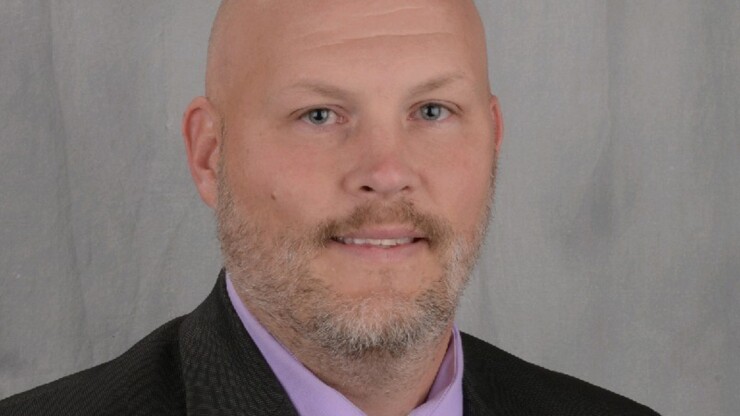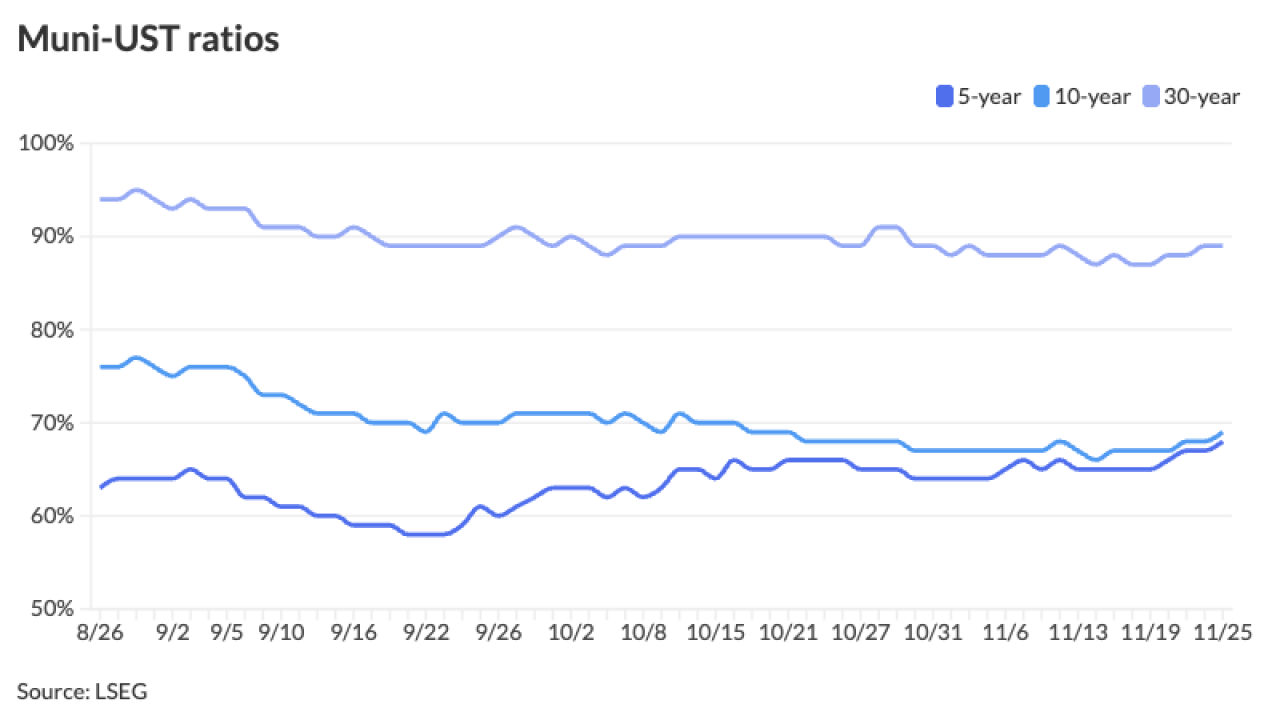
Wisconsin's February refunding deal introduced a fixed spread tax-exempt tender that saved taxpayers millions on road upgrades, Department of Natural Resources projects and University of Wisconsin buildings — and earned Wisconsin The Bond Buyer's Deal of the Year award in the innovative financing category.
The first-of-its-kind $454.25 million transaction produced $30.2 million in present value savings from combined taxable and tax-exempt issues.
The savings benefited projects financed with the underlying bonds, such as the Nicholas Recreation Center and Camp Randall facilities on the university's flagship Madison campus; UW-Eau Claire's Garfield Ave. corridor improvements; the DNR's state fish hatchery and Eagle Tower replacement projects; the Moses Hall veterans' home; and a freeway interchange on the west side of Milwaukee.
Morgan Stanley was lead underwriter on the deal. Public Resources Advisory Group was the municipal advisor, and Foley & Lardner LLP was bond counsel.
The state of Wisconsin has blazed new trails before. It led the reintroduction of the economic refunding strategy with its October 2022 tender and has completed eight large tender deals in the past three years.
But with
The state's GOs are rated Aa1 by Moody's Ratings, AA-plus by S&P Global Ratings and Fitch Ratings and AAA by KBRA. The outlook is stable across the board.
The tender targeted 92 CUSIPs, 48 of those tax-exempts. In total, 2,430 separate tender acceptances were submitted, according to lead manager Morgan Stanley.
Of the $740.2 million of bonds that were invited, investors tendered $523.3 million, with participation on the tax-exempt bonds around $365.3 million.
The tender saw participation from large fund complexes, insurance companies and retail investors, Morgan Stanley said.
Of the 2,430 participants, 2,038 of those positions were for $250,000 or less, according to Wisconsin Capital Finance Director Aaron Heintz, meaning 93% of participants were small retail mom-and-pop investors.
"Investment bankers have a lot of ideas and a lot of those ideas we don't execute on, partly because maybe we can't, for statutory reasons, or we just get that weird feeling in your stomach that it doesn't feel right," Heintz said. "This felt right."
Wisconsin almost completed a fixed spread tax-exempt tender at the beginning of 2024 on a different transaction. "We thought we were going down the path of something similar, to be the first fixed spread tax-exempt tender, but ultimately didn't get there. … The lead dealer manager (on that deal) just, I think, failed to realize that we wanted to include it," he said.
This time, all the pieces came together. After taking a gamble on a new approach, it was vindicating to see such robust participation and significant savings, members of the deal team told The Bond Buyer.
"Actually, getting to the finish line was one of the most memorable moments, when we actually sent the documentation," Heintz said. "The other memorable moment was at the expiration of the tender, when you see the participation and it's not just the large institutional owners, it's a lot of the small retail investors that are participating."

Morgan Stanley had been working on the idea for a long time before their team brought it to the state for the 2025 deal, Morgan Stanley Executive Director Bill Mack said.
"The entire Morgan Stanley team had been thinking about it," he said. "We originally did a large tender for the state of Wisconsin in April of 2023 as a fixed spread tender for the taxables and a fixed price for the tax-exempt candidates. And the market moved a bit and I think that all of us were kind of scratching our heads and saying, you know, is there a better mousetrap out there?"
The fixed spread tax-exempt tender approach eliminates asymmetric risk for the issuer, Mack and Heintz said. With fixed price tax-exempt tenders, the market might move away from the issuer and it might opt not to accept some of the tenders.
"With this approach, the holder knows what they're going to get. As interest rates go up and down, they know what the premium is going to be; they may have to calculate out to see what their actual purchase price is going to be, but I think it's more fair treatment," Heintz said.
"When you're doing a tender for a tax-exempt bond, it means you're monetizing a call option for economic savings and having a floating tender premium coincide with the fluctuating interest rates on the refunding bonds," Mack said. "(This approach) allows everyone to go into a transaction and say, I'm expecting to get 7% savings on this bond. And having it be relatively stable, as opposed to having that fixed price tender and then you're subject to the economics changing on you."
Tender refundings have become more common in recent years, said Jessica Donnelly, senior managing director at PRAG.
"What the state did here is an opportunistic tender, whereas in the past, tenders were typically for more complex restructuring types of transactions that maybe couldn't be refunded for a certain reason. It's just not something you did all the time," she said.
As PRAG does more tenders, "we're focused on our clients getting the best economic outcome," she added. "And it's not just about the pricing of the bonds that fund the tender — which, of course, is going to be a focus. But we really look at … setting the tender prices as its own process."
Mack said it was critical that PRAG "was also a huge proponent" of this approach.
Several memorable moments stood out as they structured the deal, which was a two-year process culminating in a sprint to the finish line.
One was a refreshing change from past precedent, "us not waiting with bated breath as the rates moved, or as we had tenders coming in the last 24 to 48 hours, but seeing some tenders happening earlier in the process," Mack said.
The deal team noticed that in contrast to the 2023 deal — when investors would mostly wait until the last day to day and a half to make their final decisions about tendering — this time, large and sophisticated investors made their tender decisions much earlier in the process.
Another was seeing their collaboration with Bloomberg and the MSRB bear fruit. "Having the hourly BVAL updates on the MSRB's EMMA was a huge moment for the idea that we had worked with the state on, in terms of doing the fixed spread index for the tender for the tax-exempt bonds," Mack said.
"It's also really nice that it's transparent for everyone, not just for large investors, not just the most sophisticated investors, but even for the small retail investors," he added. "Having that publicly available index was a huge occurrence."
Having tender agent Globic on board with the approach was key, Heintz said, because Globic had to post some additional information on its website.
"The BVAL scales off of EMMA are also something that you have to keep in mind — you have to be proactive and make sure you're getting that information in a timely fashion," he said. And "there's more number crunching that has to be done to determine what the savings are when you're updating throughout the process, from launching the tender through expiration and actually setting the purchase prices of those of the bonds that are being tendered."

Donnelly recalled "being thrilled with the participation — we had 34% overall, but we had nearly 50% for the tax-exempt side of things," she said. "We went into the transaction worried, and that was my feedback to the state: we're going to do this, it hasn't been tested. Is the state prepared that your participation levels may be lower than they have been in other transactions? ... But to get through the process and have such a strong reception and have good feedback was really exciting."
The deal was more complex from a bond counsel perspective, as well, said Dana Lach, partner and business lawyer at Foley & Lardner.
"There were so many bond issues involved in the tender," she said. "That requires a significant amount of diligence from a tax perspective. That is not typical, we just don't see refundings of that many bond issues … So there is a significant amount of underlying tax diligence, which gets complicated."
Lach, a native Wisconsinite, said she is proud of her home state on two fronts. "The state is always on the cutting edge of new and innovative projects," she said, noting the finance team thought creatively to get the best return for citizens of the state.
"The other thing about Wisconsin is they really do intentionally use deal teams that are diverse; including that there's always a significant female presence," she said. "And I think that's fantastic."
Mack and Donnelly said the state was ideally suited to lead this pioneering deal: highly rated, in the market often, large debt portfolio and a leader on tenders.
"Wisconsin was the first to move off the old approach that you had to do it on a fixed price basis," Mack said. "I think that's really opened the door for even further innovation. ... It is something that I think is here to stay for issuers."
As other deal teams adopt this approach, Mack advised they "be really selective" about what they include in the tender and what they're ultimately refunding. Going too far out and not getting your proper value for monetizing that call option can be counterproductive, he warned.
When it does a tender, Wisconsin's finance team members always "take the best candidates that they can take at any given time," Donnelly said. Heintz's perspective throughout this deal was: I want it priced accurately and I want to get the most out of the candidates that I can, she said.
"I don't think we're going to stop trying to do this kind of fixed spread (tax-exempt tender)," Heintz said. "It makes sense."





